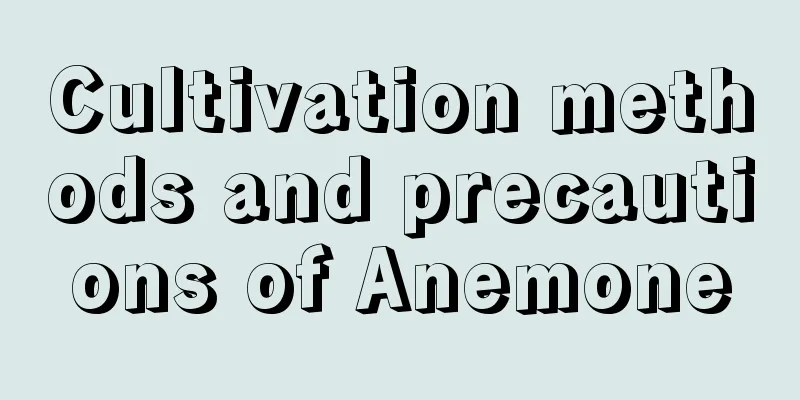Cultivation methods and precautions of Anemone

How to grow anemonePot soil selectionTo grow anemones, you can choose a mixed potting soil, mix garden soil, leaf mold and wood ash in a certain proportion, and add some base fertilizer, and require good drainage. Light and temperatureGrowing anemones requires two conditions: coolness and sufficient light. Anemone can withstand cold, but avoid high temperature. The suitable temperature for its growth is between 15℃ and 35℃. The temperature in winter needs to be no lower than 10℃. It can survive the winter safely and can be placed in a sunny place indoors. If conditions permit, it can be placed in a greenhouse for maintenance. Watering and fertilizingWhen growing anemones, you need to keep the soil moist, but be careful when watering so that the soil in the pot is not too wet to avoid root rot. There is less water in winter, so watering can be reduced. In rainy seasons, anemones need to be placed in a dry place for maintenance, protected from rain, and watering should be stopped. Generally, a thin layer of fertilizer water should be applied once every half a month. During the flowering period, in order to promote the formation of flower buds, it can be applied once a week. Reproduction methodThe main methods of reproduction of Anemone are sowing and dividing bulbs. Sowing is in autumn and the seeds are sown as soon as they are collected. Bulb division propagation mainly refers to the division and planting of Anemone bulbs. Anemone cultivation precautionsPests and diseasesAnemones may have diseases and pests, the main diseases are rot, damping-off, gray mold, powdery mildew, etc. The damage is relatively serious and requires timely prevention and control. The pests are mainly aphids and cutworms, which can be sprayed with common insecticides. Seed CollectionAnemone can be sown, and the seeds are usually sown as soon as they are collected. The seeds must be harvested in time, otherwise they will be blown away by the wind. The harvested seeds should be placed in a ventilated and dry place for maintenance. |
<<: Cultivation methods and precautions of yellow bell flower
>>: Cultivation methods and precautions of Jade Leaf Golden Flower
Recommend
What to do if Xiaomi Star grows too tall
The reason why millet star grows too long The big...
Clivia fertilization and maintenance, the correct way to water
1. Fertilization method Clivia is usually fertili...
How to grow passion fruit to make it bloom and bear fruit? How many times a year does passion fruit in the south bear fruit?
1. Maintenance skills 1. Even light: When growing...
Lotus root planting conditions and climate requirements
Lotus root planting conditions Lotus root is a li...
Is the plant that likes shade or sunlight?
Does the fuguizi prefer yin or yang? The most pre...
How to propagate the oil painting spider plant by cuttings How to propagate the oil painting wedding spider plant by cuttings
You can use clean river sand for cuttings and dis...
Side effects and contraindications of money grass
1. Side Effects Moneywort is not suitable for lon...
Why are the leaves of the dragon blood tree turning yellow?
Causes of yellowing No potting for a long time Al...
Breeding methods and precautions of money string
1. Soil It is recommended to choose sandy soil wi...
When and how to plant foxglove
Foxglove planting time Foxglove can be sown in th...
What should I do if Euphorbia milii loses its leaves?
Overwatering The first reason may be that too muc...
How to Plant Moringa Seeds
1. Select seeds Not all Moringa tree seeds germin...
Is it difficult for a novice to choose flowers? These “3 types” are good. Just water them and the pot will be full in 30 days!
In fact, if you are afraid that you will not be a...
When is the best time to plant gourd seeds?
Gourd seed planting time Gourd is an annual climb...
What should I do if the red blush on the leaves of the Dancing with the Wind disappears and the leaves turn green?
1. Insufficient nutrients Reason: Its leaves have...









